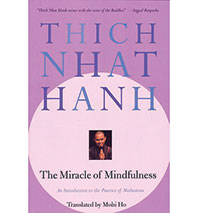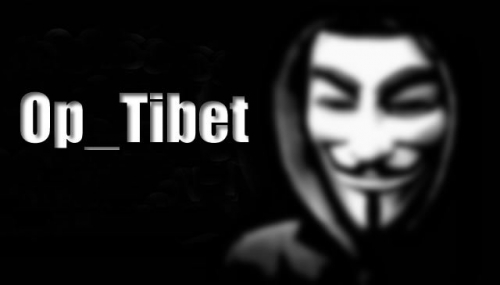Some of us Buddhists, myself included, like to decry Buddhism being used as self-help or therapy. And yet, Buddhism has become so entwined with self-help that in New York Magazine‘s recent self-help issue, half of the six feature articles mention Buddhism in some way. Kathryn Schulz’s piece “The Self in Self-Help,” accurately summarizes the whole phenomenon in just one sentence: “Curiously, Buddhism is simultaneously a burgeoning influence on the Western self-help movement and entirely at odds with it: anti-self, and anti-help.”
 Schulz’s article stands out for its intelligent investigation into what Buddhism has to offer self-help—if anything. And though it doesn’t ask whether Buddhism stands to lose or compromise something by the association, the rest of the articles in the issue somewhat answer that question in and of themselves. For instance, Thich Nhat Hanh’s The Miracle of Mindfulness: An Introduction to the Practice of Meditation, appears in their roundup “How to Read 31 Books in Four Minutes,” which breaks down popular self-help books into two or three quick, digestible takeaways. The Miracle of Mindfulness is summarized as: “When washing dishes, treat each of them as objects of contemplation and focus on the rhythm of your breath. Try to remain mindful for an entire day—as you bathe, do chores, even speak.” A fair summary, maybe—I haven’t read the book—but it does appear alongside other books whose guiding lessons were “If you’re male, arrange to have a female friend accompany you on a night out to purposely laugh at your jokes” and “Practice saying the word great in the mirror using various inflections until you’ve made yourself laugh,” both of which, I’m sorry to say, I’m loathe to place on par with meditation practice.
Schulz’s article stands out for its intelligent investigation into what Buddhism has to offer self-help—if anything. And though it doesn’t ask whether Buddhism stands to lose or compromise something by the association, the rest of the articles in the issue somewhat answer that question in and of themselves. For instance, Thich Nhat Hanh’s The Miracle of Mindfulness: An Introduction to the Practice of Meditation, appears in their roundup “How to Read 31 Books in Four Minutes,” which breaks down popular self-help books into two or three quick, digestible takeaways. The Miracle of Mindfulness is summarized as: “When washing dishes, treat each of them as objects of contemplation and focus on the rhythm of your breath. Try to remain mindful for an entire day—as you bathe, do chores, even speak.” A fair summary, maybe—I haven’t read the book—but it does appear alongside other books whose guiding lessons were “If you’re male, arrange to have a female friend accompany you on a night out to purposely laugh at your jokes” and “Practice saying the word great in the mirror using various inflections until you’ve made yourself laugh,” both of which, I’m sorry to say, I’m loathe to place on par with meditation practice.
Buddhism even gets a flyby mention in the essay “Elizabeth Wurtzel Confronts Her One-Night Stand of a Life,” by the Elizabeth Wurtzel of Prozac Nation fame, although it’s the sort of mention that you grimace at instead of celebrate: “[My boyfriend and I] would laugh about whether Buddhism could rightly be called a religion or a phase people go through.” I think it was more an observation about those spiritual types—you know the ones—who change their religion as often as their boyfriend, rather than a thoughtful question about whether the world at large should view Buddhism as a serious religion, but still, Elizabeth…offensive, much?
 We’re almost 3 weeks into 2013, and already, two more Tibetans have self-immolated, bringing the total count to 97. China continues to spew out propaganda—the Dalai “clique” has masterminded the self-immolations; self-immolations are “un-Buddhist,” etc.—even going so far as to release a self-immolations “documentary” dedicated to disclosing the “truth.” (I hope you’ve caught my sarcastic use of quotation marks there.) Meanwhile, the hacktivist group Anonymous, in an effort called Op_Tibet, are involved in a mass hack of Chinese government websites. So far they’ve managed to deface several and totally crash one in Amdo, Tibet.
We’re almost 3 weeks into 2013, and already, two more Tibetans have self-immolated, bringing the total count to 97. China continues to spew out propaganda—the Dalai “clique” has masterminded the self-immolations; self-immolations are “un-Buddhist,” etc.—even going so far as to release a self-immolations “documentary” dedicated to disclosing the “truth.” (I hope you’ve caught my sarcastic use of quotation marks there.) Meanwhile, the hacktivist group Anonymous, in an effort called Op_Tibet, are involved in a mass hack of Chinese government websites. So far they’ve managed to deface several and totally crash one in Amdo, Tibet.
Every time I post something about self-immolation on the blog, inevitably readers here or on our Facebook page begin to debate about whether committing suicide is “un-Buddhist.” (Personally, I think that the Tibetan self-immolations aren’t really “committing suicide,” tied as the acts are to a greater political cause, but that’s just me.) I was happy to see Zen teacher Brad Warner over at his blog “Hardcore Zen” take a stab at answering the question of what the Buddhist view on suicide is this week. He says early on and point-blank that he doesn’t really know; suicide is one of those topics that you can find a lot of contradictory evidence about in the sutras. (Self-sacrifice in the Jatakas, for instance, versus the upholding of nonviolence.) But then he shares his own experience with wanting to commit suicide, and why he didn’t do it, and the post turns poignant:
I put a bunch of rope in the trunk of my car and drove out to the Gorge Metro Park, just down the street from where I lived. My plan was to carry that rope out as far away from people as I could, find a sturdy tree and do the deed. But when I stepped out of my car I saw some kids playing in the field right near the parking lot. I realized I could never find a spot far enough off the path where there wasn’t some chance a little kid out for a hike, or a young couple looking for a make-out spot, or an old man with a picnic basket and a picture of his late wife might find me. Then I thought about my mom and how bummed out she’d be if I killed myself. And I thought about my friend “Iggy” Morningstar who’d killed himself about ten years earlier and how I was still not over that. I put the rope back in the trunk and went home.
That day changed me forever. I decided to live. But I also decided I was no longer bound to anything that came before that day. I decided that conceptually I had already killed myself. Now I could do anything, absolutely anything at all…
If you’re contemplating suicide, my advice is go ahead and kill yourself. But don’t do it with a rope or a gun or a knife or a handful of pills. Don’t do it by destroying your body. Do it by cutting off your former life and going in a completely new direction.
So maybe there is, in the end, room for both Buddhism and self-help at the table.
P.S. Speaking of Buddhism and self-help, everyone should read this fabulous overview of HBO’s TV series “Enlightened,” which appeared in The New Republic yesterday. If you haven’t seen “Enlightened” yet, you should! Tricycle did its own review of the show in our Spring 2012 issue.
Thank you for subscribing to Tricycle! As a nonprofit, we depend on readers like you to keep Buddhist teachings and practices widely available.